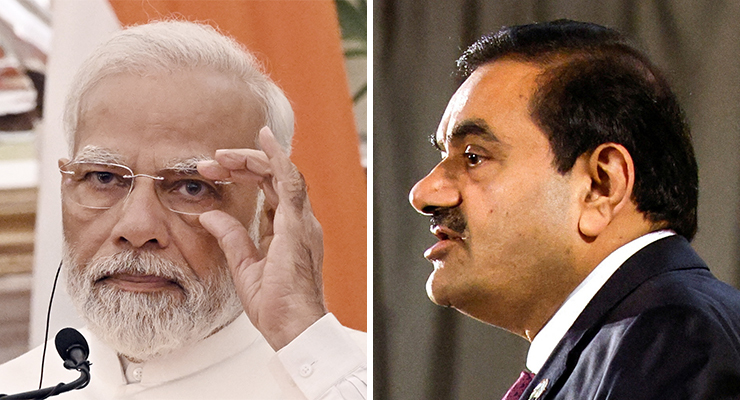
Documents have revealed India’s Modi government gave Adani Enterprises an exemption to mine in one of India’s most dense forests despite a Supreme Court ruling, dubbed “Coalgate”, that found such coal block allocations were “illegal”.
In the past decade, Adani has mined more than 80 million tonnes of coal from the block, an investigation from The Reporters’ Collective (TRC) and Al Jazeera has found — a lucrative revenue source for eponymous Gautam Adani as he rapidly scaled his business into a multi-industry empire.
The damning investigation intensifies the scrutiny of Prime Minister Narendra Modi and Adani’s close personal relationship amid the rise and reign of both powerful men in India — as well as the billionaire tycoon’s recent meteoric fall.
Here’s what you need to know.
Coalgate grips India
The saga begins in 2014, when India’s Supreme Court cancelled the allocation of 204 coal blocks to companies on the basis that they’d been illegally allocated to other companies — including ones owned by state governments.
In addition, the contracts, known as Mine Developer and Operators (MDOs), were awarded to such companies for secret prices — including to the Adani Group, which by that year had scored no fewer than five of them.
Analysis from the government’s accounts auditor found the Coalgate saga had caused a nominal loss to India’s coffers to the tune of $22 billion, a massive blow to the country’s faith in government integrity and transparency.
In its ruling, the Supreme Court pointed out the scam had taken place without relevant legislation, declared it illegal, and used its judicial power to void all relevant mining contracts in a sweeping move that rocked the industry.
Enter Modi, the ‘anti-corruption crusader’
On the face of it, then-Gujarat chief minister Modi was as disgusted as anybody about Coalgate, tweeting earlier in the scandal that the “Coal scam has darkened the face of entire nation”, and quipping that the “AICC is now an abbreviation for All India Coal Congress” (the All India Congress Committee is the former government’s decision-making arm).
Rising star Modi rode this anti-corruption wave all the way to the 2014 election, where he led the Bharatiya Janata Party (BJP) as it toppled the United Progressive Alliance (UPA) government in a thumping victory.
But documents unearthed in the investigation found the new Modi government did not upend crony capitalism as it vowed — indeed it appears the new government made it astonishingly straightforward for the Adani Group to continue to mine via another pathway.
Modi government’s 204 coal blocks
In the aftermath of the election, the Modi government quickly legislated to ensure all coal blocks were auctioned off to the highest bidder, rather than allocated for free. But it had left a loophole in allowing itself to decide which blocks to auction and which to allocate to state governments.
The government also legislated the controversial MDO contracts, and recommended they stay partly or wholly out of the public eye, meaning the price of such contracts was again shrouded in mystery.
In effect, the secrets that Modi’s government were elected to stamp out after the UPA’s fraught reign were nearly all back, and this time they were legislated.
Adani’s payday
Another provision to the new legislation permitted the state governments to continue with the original MDO contracts attached to mines — the very contracts that had been annulled by the Supreme Court — even if it meant mines stayed between state government-owned companies.
The Adani Group was back in business: it had again secured the lucrative contract for the Parsa East and Kente Basan coal mine in Chhattisgarh’s Hasdeo Arand forests, a once-stunning jewel spread over 170,000 hectares and home to endangered animals like the elephant and sloth bear.
“Pursuant to reallotment, [Rajasthan’s electricity generation company] has decided to continue the existing contract with PKCL [Adani’s joint venture] for development and operation of the coal block,” Adani Enterprises’ annual report noted in 2015.
Scrutiny intensifies on MDOs
By March 2020, bolstered by a revealing government think tank report and increasing public scrutiny, freedom of information documents showed the Indian Prime Minister’s Office and other government departments were concerned about the MDO model.
Then-deputy secretary and current private secretary at the PMO Hardik Shah wrote in 2020 that “the practice of MDO appointment” lacks “consistency and transparency” for which it will “continue to be questioned in public domain”, TRC’s investigation found.
Shah quoted the cabinet secretary in the letter that “appointment of MDOs before the allotment of mineral blocks appears inappropriate and this may not be allowed in future”.
Officials made the decision to stop issuing the MDO contracts moving forward. By this stage, just one MDO pre-dated the Supreme Court decision — and it belonged to the Adani Group, which continues to mine the Parsa East and Kente Basan coal mine today.
Officials did not recommend that contract be voided, and it is not clear why. It meant the Adani Group became the only exception to the rule.
In a lengthy statement to TRC and Al Jazeera, an Adani Group spokesperson said that all contracts were awarded through a transparent and competitive bidding process in accordance with all applicable laws.








Crikey is committed to hosting lively discussions. Help us keep the conversation useful, interesting and welcoming. We aim to publish comments quickly in the interest of promoting robust conversation, but we’re a small team and we deploy filters to protect against legal risk. Occasionally your comment may be held up while we review, but we’re working as fast as we can to keep the conversation rolling.
The Crikey comment section is members-only content. Please subscribe to leave a comment.
The Crikey comment section is members-only content. Please login to leave a comment.